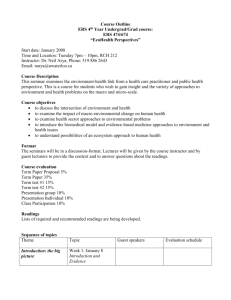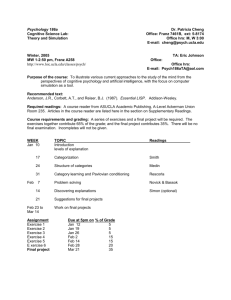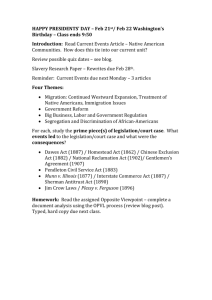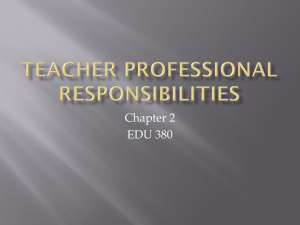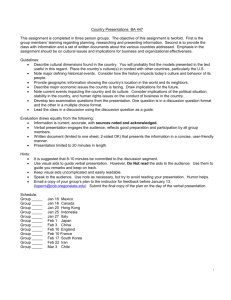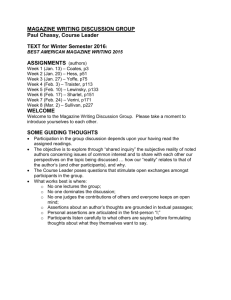Class participation includes homework, group work
advertisement
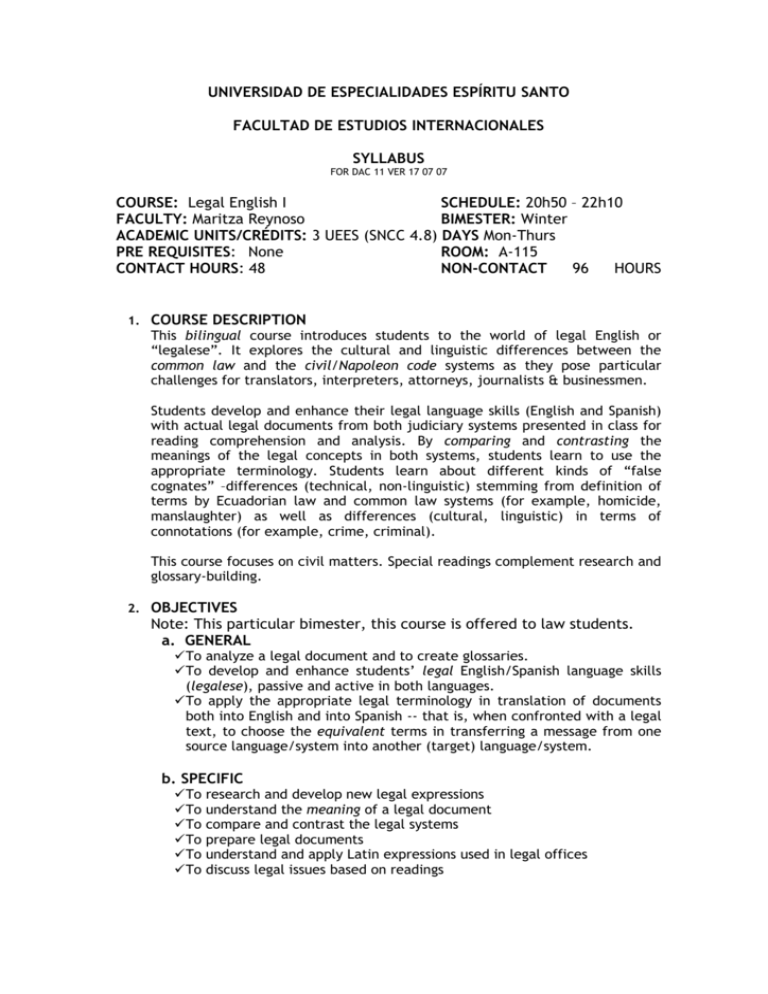
UNIVERSIDAD DE ESPECIALIDADES ESPÍRITU SANTO FACULTAD DE ESTUDIOS INTERNACIONALES SYLLABUS FOR DAC 11 VER 17 07 07 COURSE: Legal English I SCHEDULE: 20h50 – 22h10 FACULTY: Maritza Reynoso BIMESTER: Winter ACADEMIC UNITS/CRÉDITS: 3 UEES (SNCC 4.8) DAYS Mon-Thurs PRE REQUISITES: None ROOM: A-115 CONTACT HOURS: 48 NON-CONTACT 96 HOURS 1. COURSE DESCRIPTION This bilingual course introduces students to the world of legal English or “legalese”. It explores the cultural and linguistic differences between the common law and the civil/Napoleon code systems as they pose particular challenges for translators, interpreters, attorneys, journalists & businessmen. Students develop and enhance their legal language skills (English and Spanish) with actual legal documents from both judiciary systems presented in class for reading comprehension and analysis. By comparing and contrasting the meanings of the legal concepts in both systems, students learn to use the appropriate terminology. Students learn about different kinds of “false cognates” –differences (technical, non-linguistic) stemming from definition of terms by Ecuadorian law and common law systems (for example, homicide, manslaughter) as well as differences (cultural, linguistic) in terms of connotations (for example, crime, criminal). This course focuses on civil matters. Special readings complement research and glossary-building. 2. OBJECTIVES Note: This particular bimester, this course is offered to law students. a. GENERAL To analyze a legal document and to create glossaries. To develop and enhance students’ legal English/Spanish language skills (legalese), passive and active in both languages. To apply the appropriate legal terminology in translation of documents both into English and into Spanish -- that is, when confronted with a legal text, to choose the equivalent terms in transferring a message from one source language/system into another (target) language/system. b. SPECIFIC To research and develop new legal expressions To understand the meaning of a legal document To compare and contrast the legal systems To prepare legal documents To understand and apply Latin expressions used in legal offices To discuss legal issues based on readings 3. COURSE CONTENT OUTLINE DATES & SESSIONS Session 1 Jan. 14 SPECIFIC COMPETENCIES Research legal documents. Read / analyze document. CONTENTS - Lecture: The Nature of the legal Profession - Legal Vocabulary NON CONTACT HOURS Prepare a list of tasks and duties a paralegal is supposed to do in a law firm. 3 hours. ASSESSMENT . Start Reading Gideon Trumpet pages 1 to 117 Session 2 Jan. 15 Prepare comparative charts, build glossary Session 3 Jan.16 Session 4 Jan.17 Session 5 Jan. 21 Analyze and discuss legal issues/applied terminology Session 8 Jan. 24 Not. Public, duties and responsibilities. NonCourt documents: Affidavit, Power of Attorney, Acknowledgments Collection of the Chart of Notary Public and Non Court Documents. Class Presentation. Reading Control.Comments on the book, analysis of terminology. The US CONSTITUTION. The US Constitution as a Compact Analysis of the first 7 articles. Session 6 Jan. 22 Session 7 Jan. 23 Oral Practice, students will read their homework. Introduction to the Law of Notaries Compare contrast systems and Statutory and Case Law. legal Difference between Federal/State Statutory Case Law Analysis of the Research work, Reading Control 10 hours Download from Presentation the www the law of Notary Public and prepare a Chart comparing main tasks and duties of a NY N.P. and those of an Ecuadorian Notary Public. 6 hours Prepare: Chart presentation Affidavit, Power of Attorney, Durable Power of Attorney 3 hours Select terminology for the glossary of terms. 3 hours Research/Download from Website the US Constitution and read the first 7 articles. Download Bill of Rights. 6 hours In class discussion of Gideon Trumpet Oral quiz on terminology. Quiz on US Constitution Read: Gideon Trumpet pages 118 to 160 5 hours. Prepare work on The Civil System in Session 9 Jan.29 *The US Legal System: Common Law, Civil Law and Equity Session 10 Jan. 30 Collection of research work, the civil system in Ecuador Civil Litigation: The Complaint, Service of Process, etc. Session 11 Jan. 31 Compare and contrast legal systems Reading Control Session 12 Feb. 6 Session 13 Feb. 7 Session 14 Feb.11 Session 15 Feb. 12 Session 16 Feb. 13 Civil Litigation: Part II, Discovery. Compare it with legal system in Ecuador Compare and contrast legal systems Review of Civil Litigation I and II The Writ of Habeas Corpus. Reading control Review for the exam Ecuador 4 hours Research Group work: Ecuadorian legal system 3 hours Research: Glossary 3 hours Glossary of terms, select terms. 3 hours Read from 161 to 238 Gideon Trumpet Research: origin of Writs, Mention and explain 5 different writs and its use in the legal practice 6 hours End of Gideon Trumpet finish the Book Study for the Midterm Exam Midterm Exam Analyze documents, Vocabulary building (Family Law) Session 17 Feb. 14 Success with legal words, Vocabulary practice Introduction to Family Matters Vocabulary Family Matters: Preparation of a Marital Settlement Agreement Session 18 Feb. 18 Read Buffalo Creek Disaster pages 1 to 145 12 hours Work on different family Matter Cases 3 hours Session 19 Feb. 19 Session 20 Feb.20 Discussion and Presentation. Marital Settlement Agreement Collection of Homework of Family Matters Apply specialized terminology. Prepare legal documents Session 21 Feb.21 Session 22 Feb. 25 Discuss issues legal Probate Proceedings: Guardianships and Conservatorships, Letters Reading control. Class discussion Vocabulary Exercises Contracts. Offer and Acceptances.Unilateral, Bilateral, Quasi contracts Research actual documents 3 hours Research Probate Proceedings 3 hours Quiz on Readings and Research In-class discussion Oral quiz on writs, civil litigation MIDTERM EXAM Reading: content quiz Check homework content in class, discussion, q/a In class discussion about Family Matters In Class Presentation s Prepare a Will. Research different types of wills 2 hours Buffalo Creek.- read 146 to 243 12 hours Prepare a Contract 3 hrs Group Discussion Session 23 Feb 26 Session 24 Feb 27 Session 25 March 3 Contracts analysis of some cases. Read: pages 244 to 307 Review/recap for exam FINAL EXAM Reading Control Oral quiz Session 26 FINAL EXAM – on readings March 4 4. METHODOLOGY Professor will introduce new topics and will explain contents of each Unit.. Assessment: we will have brainstorming sessions in class to check up on student progress and compliance with readings. Students are expected to research and prepare for class. This course is aimed at students of law and we will assess students level of prior knowledge of legal concepts. Discussions in class are important and will offer the context (language, culture, legal systems, history of law) necessary for you to understand the importance and to develop good diction skills. Thus, you will learn to choose and apply the appropriate terms. Students will be assigned research topics and will make presentations in class either individually or in groups. The class starts by reviewing previous class and checking up on the readings. Students answer questions about the topics discussed in previous class, must give examples and professional opinions. In-class participation and practice consists of comparing Ecuadorian Legal System and the US Common Law with students finding the correct terminology, performing written exercises using legal words. Examples of homework assigned are: a) Download information from Internet the Law of Notary of the State of New York and preparing chart of the role of a Notary Public in the State of New York and compare it to the role of an Ecuadorian Notary Public. b) Preparation of specific documents, i. e. Affidavit, Power of Attorney, Marital Agreement) or producing a document incorporating the new terms introduced and discussed in class. c) Research the origin of legal instruments (i.e. writs) or legal definitions (i.e. types of marriage, or issues such as grounds for divorce, annulment and so on. d) Glossary- building (bilingual) on topics at hand. Attendance Policy: Strict attendance policy: because this is a “materia dirigida”, 2 tardies count as 1 absence. NOTE: Only 5 absences allowed. No cell phones in class, no food or drinks. No text-messaging. 5. ASSESSMENT Final Grade The progress will be evaluated as follows: Class participation – contribution: 100 points (50%) Midterm Exam: 100 points (25%) Final Exam: 100 points (25%) Final Exam will be structured in two parts: one for theory, vocabulary, class material and one for readings. NOTE: Attendance is required. Your contribution is an important part of the learning experience gained by each of your peers. Absence means you are taking away from the class dynamic and evolving culture of the class. Unexcused absences will seriously hurt the “Class participation – contribution” portion of your grade. Class participation includes homework, group work, research, readings. Class Participation 50% of the grade. Discussions in class will include readings. Class Participation means: full attendance, group work, in class presentations and discussions, homework, and readings. 6. BIBLIOGRAPHY 6.1 REQUIRED Law 101, Brian A. Roche, Sphinx Publishing 6.2 COMPLEMENTARY The Glannon Guide to Civil Procedure, Joseph W. Glannon, Aspen Publishers You and the Law Legal Office Procedures Paralegal Distance Course How to form your own LLC, Nolo Collection 6.3 SUPPLEMENTARY READING Copies and materials are provided by teacher. 6.4 WEBLIOGRAPHY: www.lectlaw.com www. newyorknotaries.com 7. FACULTY INFORMATION NAME: Abg. Maritza Reynoso Wright ACADEMIC CREDENTIALS- UNDERGRAD: Attorney at Law admitted to practice in the Ecuadorian Courts of Justice Notary Public, State of New York GRADUATE: Especialista en Derecho Empresarial Tesina: Derecho Ambiental UTPL--Universidad Técnica Particular de Loja E – mail: mreynoso@gye.satnet.net Prepared by: Maritza Reynoso de Wright Date: January, 2007 Reviewed by: Monica Reynoso, Dean Date:
